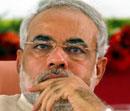
Gandhinagar, May 30: Former Gujarat chief minister Suresh Mehta Wednesday said the Narendra Modi regime was akin to the Emergency rule of 1975-77.
"Even if we are unsure that our phones are tapped or not, we don't dare to speak and discuss about Gujarat over phone,” Mehta told the media at former chief minister Keshubhai Patel's residence here.
Patel had called all old Bharatiya Janata Party (BJP) leaders to work out a strategy against Chief Minister Modi.
Mehta declined to disclose the agenda of the meet, but admitted that those gathered at Patel's residence took stock of "the present governance".
He said that even a minister's house was unsafe in Gujarat today and accused BJP vice president Purshottam Rupala of teaching party workers to bribe voters before the election code of conduct comes into effect.
Besides Keshubhai Patel, former cabinet minister Kashiram Rana, former MP K.D. Jeswani, Bhaskrao Damleji and others sidelined by Modi attended the meeting.
"I am unhappy with the BJP high command and so left a long back. But it is too early to say who we will support in the next election," he said.
He said many were pained the way the BJP leadership "succumbed to Modi".
The obvious reference was to BJP president Nitin Gadkari's decision to force Sanjay Joshi out of the party's national executive to ensure Modi's presence at the leadership meet in Mumbai this month.
Trouble has been brewing in the Gujarat BJP, with Keshubhai Patel leading those unhappy with Modi's style of functioning.





Comments
Add new comment